
Sore Muscles? Try These 10 Natural Remedies for Muscle Pain
Muscle pain strikes everyone at some point. Whether you pushed too hard at the gym, spent hours hunched over your computer, or woke up with that familiar stiffness, dealing with sore muscles is part of life.
The good news? You don’t always need to reach for over-the-counter pain relievers. Natural remedies can provide effective relief while supporting your body’s healing process.
Key Takeaways
- Turmeric and cherry juice offer powerful anti-inflammatory benefits backed by research
- Cold therapy works best for new injuries, while heat helps chronic muscle tension
- Magnesium deficiency often contributes to muscle pain and cramping
- Natural remedies take longer to work than medications but provide lasting relief with fewer side effects
Understanding the Causes of Muscle Aches

Before diving into solutions, let’s look at why muscles hurt in the first place.
Your muscles can ache from various triggers. Exercise creates tiny tears in muscle fibers, leading to delayed onset muscle soreness. Poor posture strains muscles over time. Stress causes tension that builds up in your shoulders and neck.
Viral infections can also cause widespread body aches and pains. Even dehydration or nutrient deficiencies can leave you feeling stiff and uncomfortable. When you experience muscle pain regularly, identifying the root cause helps you choose the most effective natural approach.
The key is understanding what’s triggering your discomfort so you can target the right remedy to feel better.
1. Turmeric: Powerful Anti-Inflammatory Pain Relief
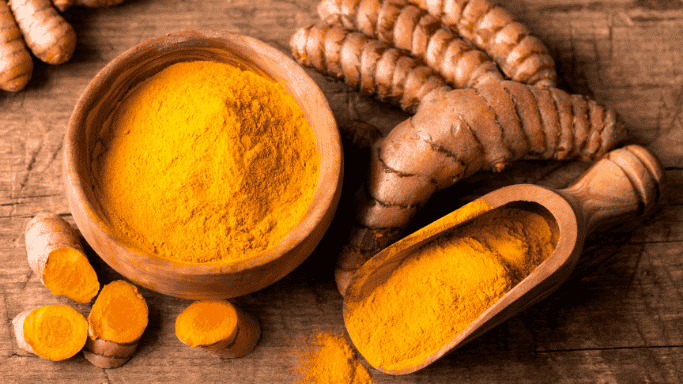
Turmeric deserves the top spot on any list of natural muscle pain fighters.
This golden spice contains curcumin, a compound that reduces exercise-induced muscle damage and delayed onset muscle soreness. Research shows curcumin works by blocking inflammatory pathways in your body.1
Studies demonstrate that taking 150-1500 mg of curcumin daily can significantly reduce muscle pain and inflammation. The compound may work as effectively as ibuprofen but with fewer gastrointestinal side effects.2
For maximum benefit, look for turmeric supplements that include black pepper extract. This combination increases absorption dramatically. Many people find that curcumin or turmeric root provides better results than synthetic alternatives.
Jinfiniti’s Extra Strength Turmeric+ combines 95% curcuminoids with boswellia, ginger, and black pepper extract for enhanced bioavailability and comprehensive anti-inflammatory support.
2. Epsom Salt Baths: Simple Home Remedies for Muscle Aches

Sometimes the best home remedies are the simplest ones.
Epsom salt baths have been soothing sore muscles for generations. The magnesium sulfate in these salts helps draw excess fluid from tissues. This action reduces pain and swelling naturally.
Magnesium plays an important role in muscle function by regulating the balance between contraction and relaxation. While scientists debate how much magnesium actually absorbs through your skin, the warm water and mineral combination provides real therapeutic benefits.3
Add 1-2 cups of Epsom salt to a warm bath and soak for 15-20 minutes. The heat increases blood flow while the minerals help your muscles relax naturally.
3. Hot and Cold Therapy for Acute Pain Relief
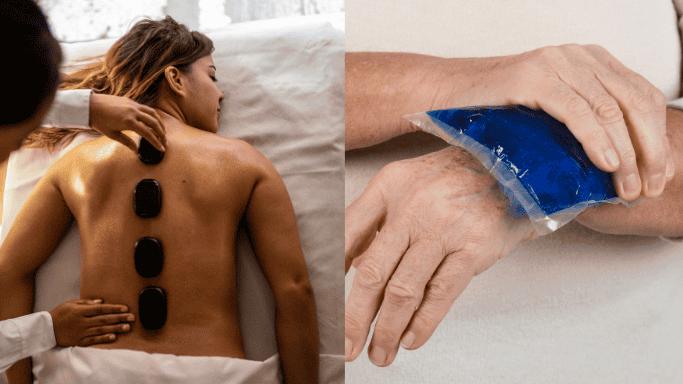
Temperature therapy is one of the most effective natural ways to manage muscle discomfort.
Cold therapy works best for new injuries or acute pain. Apply ice packs for 15-20 minutes several times daily, especially within the first 48 hours. Cold reduces inflammation by constricting blood vessels and numbing pain signals.4
Heat therapy shines for chronic tension and stiffness. Warming muscles increases blood flow and helps remove waste products like lactic acid. This process can reduce muscle soreness over time.5
Here’s when to use each approach:
- Ice: Fresh injuries, swelling, sharp pain
- Heat: Chronic tension, stiffness, tight muscles
- Avoid heat on acute inflammation
4. Cherry Juice: Sweet Relief for Body Aches

Tart cherry juice isn’t just delicious. It’s also a powerful natural remedy for muscle soreness.
Studies show that drinking tart cherry juice before and after exercise significantly reduces post-workout muscle pain. The anthocyanins in cherries combat exercise-induced muscle damage and reduce inflammation naturally.6
Tart cherries contain high levels of antioxidants that help your body recover faster from physical stress. You can drink the juice straight or mix it into smoothies for added nutrition.
Just watch the sugar content if you’re monitoring your intake. Look for 100% tart cherry juice without added sweeteners for the best results.
5. Essential Oils: Natural Pain and Inflammation Relief

Essential oils offer targeted relief when applied topically to sore areas.
Several oils have proven antiinflammatory and pain-relieving properties:
- Peppermint oil: Improves circulation and provides cooling relief7
- Eucalyptus oil: Contains compounds that reduce muscle tension and swelling
- Lavender oil: Offers anti-inflammatory benefits and promotes relaxation
- Rosemary oil: Has stimulating properties that help various muscular conditions
Never apply essential oils directly to your skin. Mix a few drops with a carrier oil like coconut or olive oil first. Start with a patch test to make sure you don’t react to the oil.
For people seeking broader approaches to managing inflammation, exploring natural herbs and spices that fight inflammation can provide additional options beyond topical treatments.
6. Magnesium Supplementation for Musculoskeletal Pain
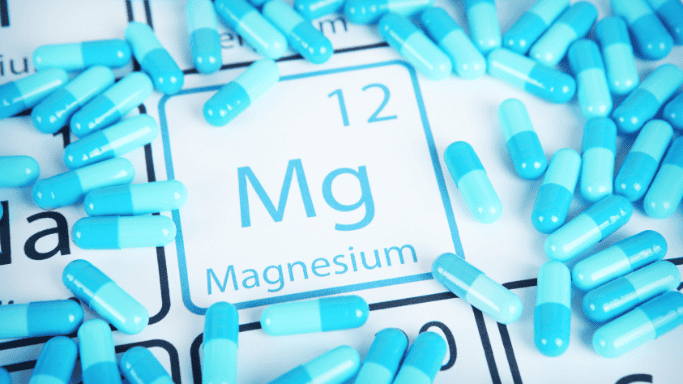
Your muscles need magnesium to function properly. When levels drop, you experience muscle pain and stiffness more easily.
Research shows that taking 350-500 mg of magnesium daily can reduce delayed onset muscle soreness and improve recovery. This mineral regulates calcium transport in muscle cells. It controls contraction and relaxation patterns.8
Many people don’t get enough magnesium from food alone. Supplementation can fill the gap and provide noticeable relief from chronic muscle tension. The right dosage can reduce pain effectively when taken consistently.
Foods high in magnesium include:
- Leafy green vegetables
- Nuts and seeds
- Whole grains
- Dark chocolate
If you experience muscle pain regularly, consider getting your magnesium levels tested to see if deficiency plays a role in your discomfort.
7. Ginger: Warming Relief for Aches and Pains
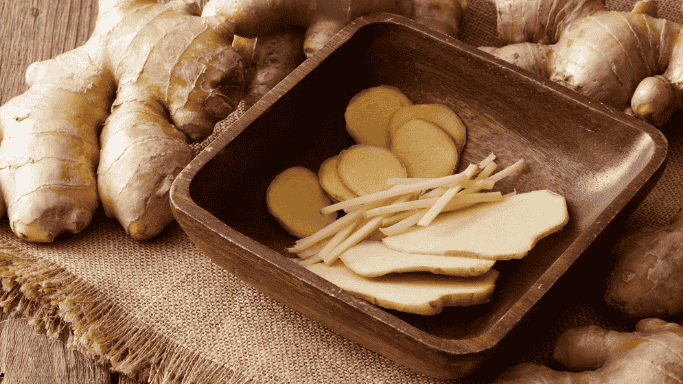
Ginger brings more than flavor to your kitchen. This warming root contains powerful compounds that reduce muscle pain naturally.
The active compound gingerol gives ginger its anti-inflammatory properties. Multiple studies show that ginger supplementation provides relief from exercise-induced muscle soreness.9
You can use ginger in several ways:
- Brew fresh ginger tea
- Add it to cooking
- Take ginger supplements after consulting your healthcare provider
The warming properties of ginger also help improve circulation. This brings healing nutrients to sore muscles while removing waste products. Research shows that turmeric and ginger work better together than either herb alone.
8. Massage Therapy: Proven Remedies for Body Aches

Touch has healing power, and massage proves this beautifully.
Research demonstrates that massage can reduce delayed onset muscle soreness by approximately 30%. It works by improving blood circulation and enhancing oxygen and nutrient delivery to muscles.10
A recent Harvard study found that mechanical pressure from massage helps clear inflammatory cells from injured tissue. This promotes faster and stronger healing compared to rest alone.
You don’t need a professional massage therapist to get benefits. Self-massage with a foam roller or massage ball can provide significant relief for tight, sore muscles.
The key is consistent pressure that helps break up adhesions and improve blood flow to affected areas.
9. Bromelain: Pineapple’s Natural Pain Fighter
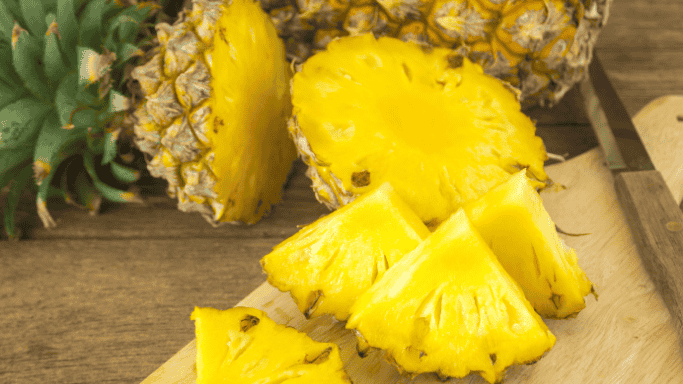
Pineapple contains a secret weapon against muscle soreness called bromelain.
This enzyme has shown impressive results in reducing post-exercise muscle pain. Studies show that bromelain supplementation significantly reduces pain intensity at 24, 48, and 72 hours after exercise.11
Bromelain works by reducing inflammatory markers like C-reactive protein and IL-6 levels. It also improves muscle stiffness, strength, and flexibility naturally.
You can get bromelain by eating fresh pineapple or taking it as a supplement. This natural enzyme offers a promising alternative to synthetic recovery aids.
For people dealing with chronic inflammation that contributes to muscle pain, understanding your oxidative stress markers can help you address underlying causes of persistent discomfort.
10. Willow Bark: Nature’s Original Pain Reliever
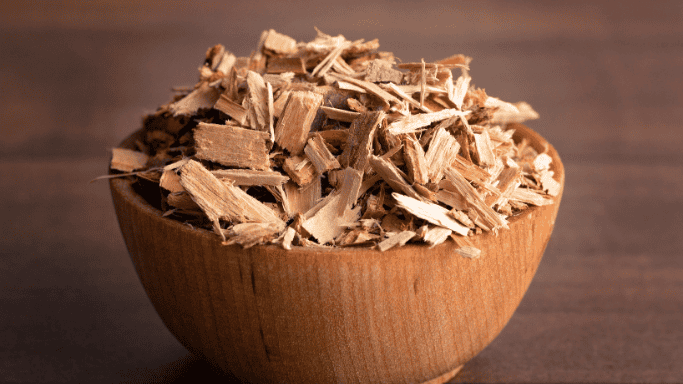
Long before aspirin existed, people used willow bark to reduce pain and inflammation.
Willow bark contains salicin, which has similar properties to aspirin but works more gently. Studies show that willow bark extract effectively reduces headaches, back pain, and joint discomfort.12
Unlike synthetic aspirin, willow bark contains a complex mix of beneficial compounds including antioxidant flavonoids and antibacterial compounds. This makes it potentially more effective than isolated salicin alone.
Research shows that doses containing 120-240 mg of salicin provide meaningful pain relief. You can take willow bark as tea, tincture, or supplement form.
When Natural Remedies for Muscle Pain Aren’t Enough

Natural remedies work well for most muscle aches, but some situations need medical attention.
See your healthcare provider if you experience muscle pain that doesn’t improve with natural approaches:
- Severe or persistent muscle pain
- Pain accompanied by fever
- Muscle weakness or loss of function
- Pain from a significant injury
- Symptoms that worsen despite treatment
These natural approaches work best as part of a complete muscle health strategy. This includes proper hydration, adequate rest, and gentle movement. Sometimes addressing chronic fatigue can also help with persistent muscle discomfort.
Supporting Your Body’s Natural Healing

Your body has remarkable healing abilities when given the right support.
These natural remedies work with your body’s systems rather than simply masking symptoms. They help reduce inflammation, improve circulation, and provide the nutrients your muscles need to recover.
For people interested in optimizing their recovery and performance, testing key biomarkers can provide valuable insights. Jinfiniti’s AgingSOS panels measure inflammation markers, oxidative stress, and cellular health indicators that affect muscle function and recovery.
Remember that consistency matters with natural remedies. Unlike pharmaceutical options that provide immediate relief, natural approaches often take time to show their full effects. The benefit is lasting relief with fewer side effects.
By incorporating these evidence-based natural remedies into your routine, you can effectively manage muscle discomfort while supporting your overall health and wellness.
Referenced Sources:
- https://revistaretos.org/index.php/retos/article/view/98671 ↩︎
- https://www.hopkinsmedicine.org/health/wellness-and-prevention/turmeric-benefits ↩︎
- https://organika.com/blogs/the-o-life/why-is-magnesium-good-for-sore-muscles ↩︎
- https://www.hopkinsmedicine.org/health/treatment-tests-and-therapies/ice-packs-vs-warm-compresses-for-pain ↩︎
- https://medicaljournalssweden.se/jrm/article/view/331 ↩︎
- https://www.healthline.com/health/pain-relief/best-natural-muscle-relaxers ↩︎
- https://food.ndtv.com/health/4-essential-oils-you-can-use-to-treat-muscle-soreness-and-pain-1721209 ↩︎
- https://www.nutraingredients.com/Article/2024/08/21/Magnesium-may-mitigate-muscle-soreness/ ↩︎
- https://www.ijisrt.com/Article/2024/08/21/Magnesium-may-mitigate-muscle-soreness/ ↩︎
- https://news.harvard.edu/gazette/story/2021/10/massage-helps-injured-muscles-heal-faster-and-stronger/ ↩︎
- https://www.ajol.info/index.php/dujopas/article/view/287347 ↩︎
- https://draxe.com/nutrition/white-willow-bark/ ↩︎

Get weekly health insights and exclusive offers by joining our newsletter.










